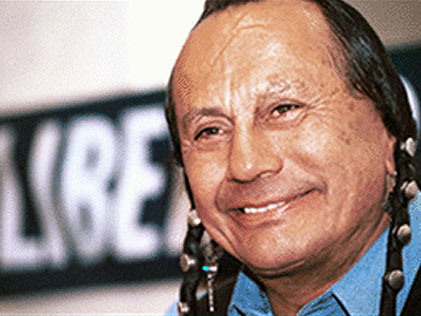The "I" WordBy Julianne JenningsThe word "Indian" is a European classification and evidence of a serious geographical mistake. "American Indian," "Native American" and the use of the term "Mixed-Blood" are also classifications that are invalid and historically incorrect and misleading. According to Indian rights activist, Russell Means, these governmentally designated terms are used to describe Native Americans as "...all the prisoners of the U.S. government" and that the idea of a Native American Heritage Month is a "...subterfuge to hide the ongoing daily genocide being practiced against my people by this United States of America." Still, many indigenous people continue to use the word Indian to describe themselves as a result of internalized colonialism.And:
As opposed to "White," Indian is a racist term. The "I" category was created to cause the ultimate vanquishing of the Indian through racial classification when all else failed to make Indians extinct. The category White is self-imposed to promote a social hierarchy of superior and inferior types. The real persons of this continent knew themselves by names that translated to "the people" or "the human beings" in relation to their physical location. Before the word "tribe" was obligatory, these differentiated people in respect to bands, clans and nations, had distinct territories, and were independent political entities with the inherent right to self-govern. Within these groups identity was based on community and society, and not race. Of the small amount of human genetic variation, eighty-six percent exists within a local population. There is more variation within a particular race than there is between different races. Race is not biological, but racism is real. These perceived "racial" differences justified colonial control, slavery and social inferiority today.And:
Tribe is another misnomer to signify one stage of cultural development in human evolution, thus the etymological origins must be understood. "Historically, the term tribe in Roman colonial expansion was referred to as "tribus," meaning a conquered people away from the centers of "civilization" at the peripheries of empire. Prior to the rise of colonialism, many of today's tribes were "nations" or "kingdoms" with whom the Europeans and Americans negotiated on a state to state basis only after these people were subjugated was tribe applied to them" (Lobban et al.). With the concomitant rise in racist ideology, tribal people came to be stereotyped as "inferior, backward, heathen and uncivilized" from the loftiness of European and colonial perspectives.Comment: I think everyone agrees we should call Indians by their tribal affiliation whenever possible. But everyone also agrees that we need a collective name for the original inhabitants of the Americas.
Without such a name, we'd have no way of talking about the collective past, present, and future of these people. For instance, try describing the significance of the phrase "The only good Indian is a dead Indian" without using the word "Indian."
So we need a collective term for these people. The alternatives commonly used include Indians, Native Americans, First Americans, First Nations, Aboriginals, and Amerindians. You can find problems with all these terms, but Indians (including Russell Means) have settled on the term "Indian." It's by far the most common term used in
Indian country.
Jennings is correct that "Indian" isn't a distinct racial category. It's more of an indistinct ethnic category with racial and cultural attributes. As we've seen, the dividing line between Indian and non-Indian often isn't clear. But at the core, Indians have a set of traits and beliefs that set them apart from non-Indians.
As for "tribe" vs. "nation," the main difference may be size. Tribes were small enough that people could have kinship ties with each other. The larger nations relied on less personal bonds such as a common language, culture, or history.
But now Indians tend to use "nation" in official or political circumstances and "tribe" in social or personal ones. It's become something like the distinction between "Indian" and "Native American." People will refer to "Native Americans" and "nations" formally and "Indians" and "tribes" informally.
For more on the subject, see
"Actual Indian" Defined and
"American Indian" vs. "Native American."Below: Russell Means, Lakota Sioux and self-described Indian.



I have heard the words 'tribe' and 'nation' used together, such as tribal nation. I feel there are more pressing matters and issues that Native America and Indian Country must face -- more important than what we call ourselves or how others refer to us. There are far more racist terms that can be used. Historically, I think the term 'hispanic' was created by the census board and is not culturally based terminology. So, whether I call myself Indian, Native American, Chickasaw or Mutt, I am part of a proud heritage no matter what you call us.
ReplyDeleteAs long as Indians call themselves Indians, and their sovereigh nations and other government entities refer to themselves as tribes or tribal, you'll have a hard time convincing anyone it's racist.
ReplyDelete